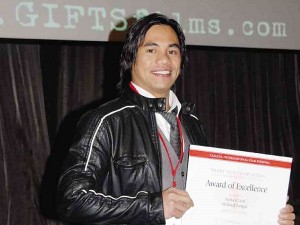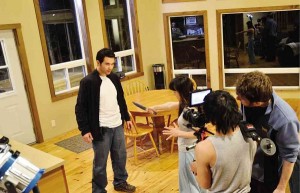Construction worker by day, filmmaker by night

IFUGAO PRIDE Wilfred Tangid receives his CIFF 2013 award of excellence for his first film, “Sofia’s Doll.” PHOTO FROM CIFF
TORONTO, Canada—As a construction worker, he dons a hard hat and works with hammers and drills throughout the day. At night he straps his camera on his shoulder and is off for more hours of work.
Wilfred Tangid’s hard work has paid off. His first short film, “Sofia’s Doll,” was recently recognized during the Canada International Film Festival 2013 held last April in Vancouver.
Wilfred, an Ifugao from the Cordillera region, says he is ready to do what it takes to follow his dreams.
Tangid didn’t have the opportunity to pursue filmmaking in the Philippines. He couldn’t afford any of the equipment, and in fact didn’t even get to touch a video camera back home.
But he had fallen in love with the movies at a very young age. As a child growing up in the northern mountainous regions, he would sneak into his neighbor’s house to watch films, especially those made by his inspiration and influence, Carlo J. Caparas.
“‘Ang Panday’ is one of my favorites—the first movie I ever watched on television. There wasn’t even a beta (betamax video player) available in my village then. Still, I started to dream as a young boy to make movies like Caparas,” shares Wilfred.
After completing high school, Wilfred insisted on studying in Manila though his family couldn’t really afford it.
He is the youngest of nine siblings, and was raised by his mother and elder siblings. His father, Sixto Tangid, a former rebel leader known as “Ka Liga,” was slain during an encounter with army troopers in 1994. He was only nine years old then. He says he had never met his father until his decomposing body was brought home to them. His only vivid memory of Ka Liga was one time when his father visited them disguised as an old woman. “I didn’t know it was my dad. I was eight years old and this old “woman” gave me the first marshmallow I’ve ever had. When the “woman” left, my mom told me that it was my dad in disguise so the soldiers would not catch him,” Wilfred recalls.
In Manila, he pursued a mass communications program at the Far Eastern University but left on his second year because his family could no longer afford the tuition.
He went back to the Cordilleras where he obtained a Bachelor of Arts degree from the St. Mary’s University in Nueva Vizcaya. The dream to make films remained in his heart.

CONSTRUCTION WORKERS Taking a break from work, Tangid (left) poses with coworker Roberto Gonzalez and his foreman Mike Bogart. PHOTO FROM CIFF
“The filmmaking industry in the Philippines is tough to get into, especially if you don’t know anyone. My background explains why I didn’t get any opportunity. Even if you dream big, hardships in life can rip you apart and eventually cause the dream to fade away. But if there is an opportunity, the dream starts to beam again,” he added.
Around this time, his sister Imelda was already in Canada and urged him to take up a caregiving course so he could come over too. He finished the caregiving training in 2005. He went to work in Baguio City as an English language teacher to Korean students while his Canadian work permit was being processed.
He waited three years for his work permit. Wilfred migrated to Canada in 2008.
He took an additional 24-month caregiving program here before getting an open work permit. He eventually got a job as a construction worker, which he says pays better than caregiving.
Wasting no time, he studied filmmaking part time while he worked in construction during the day. He took an “Independent Filmmaking” course at George Brown College, but after realizing the length of time needed to complete the program shifted to a shorter course called “Write, Produce and Direct your Screenplay.” It took him one year and a half to finish the course. His final project “Sofia’s Doll,” a psycho thriller, earned him an A+ which encouraged Wilfred to enter the film in the Canada International Film Festival (CIFF) 2013.
At 30, Wilfred hasn’t stopped studying. On weekends he attends screenwriting workshops to gain more techniques on writing perspectives.
He continues to work in construction where the pay is good, allowing him to save money for his first full length movie.
Although construction is highly labor-intensive and may require outdoor work in the middle of cold winter days, he is not ready to trade this for easier clerical work. As an independent filmmaker, he finances everything in production and needs to earn as much as he can to pursue his passion.

NIGHT SHIFTYoung filmmaker Wilfred Tangid (holding the camera) in action during the filming of “Sofia’s Doll.” PHOTO FROM CIFF
He is currently writing the second draft for his movie—tentatively titled “Alim,” (an Ifugao chant during festivities). He says it is loosely inspired by some events in his life. The story revolves around a young Ifugao who returns to his homeland to confront nightmares on the brutal killing of his parents. He hopes to make the film festival circuit.
At this point, the conversation steers towards film production where Wilfred says he is holding the Philippine Independent Film Project fundraising to help cover for costs for his full length film, which would include film locations (both in the Philippines and Canada), air fare for the main actor, equipment rentals and insurance and post-production expenses. He has launched a campaign at the Indiegogo website, a funding platform used mostly for independent and startup projects (https://www.indiegogo.com/projects/alim-a-feature-film).
Admittedly it would take so many construction work hours for him to finance the film by himself, which is why he has launched the fundraising campaign.
He is optimistic he can begin shooting in the Philippines in 2014.
Asked what direction he plans to pursue, Wilfred says he dreams of eventually going mainstream. He admits he does not know exactly where he is headed now. But he says he is now ready to go wherever his passion takes him.
